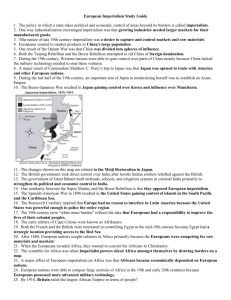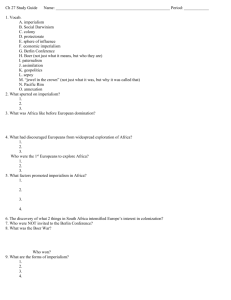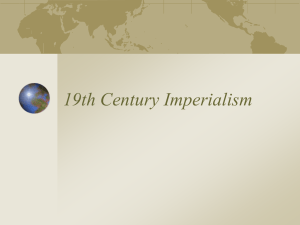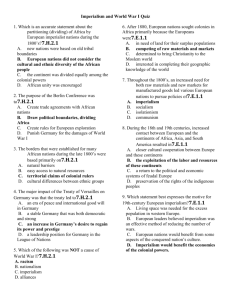Diverse Societies in Africa
advertisement
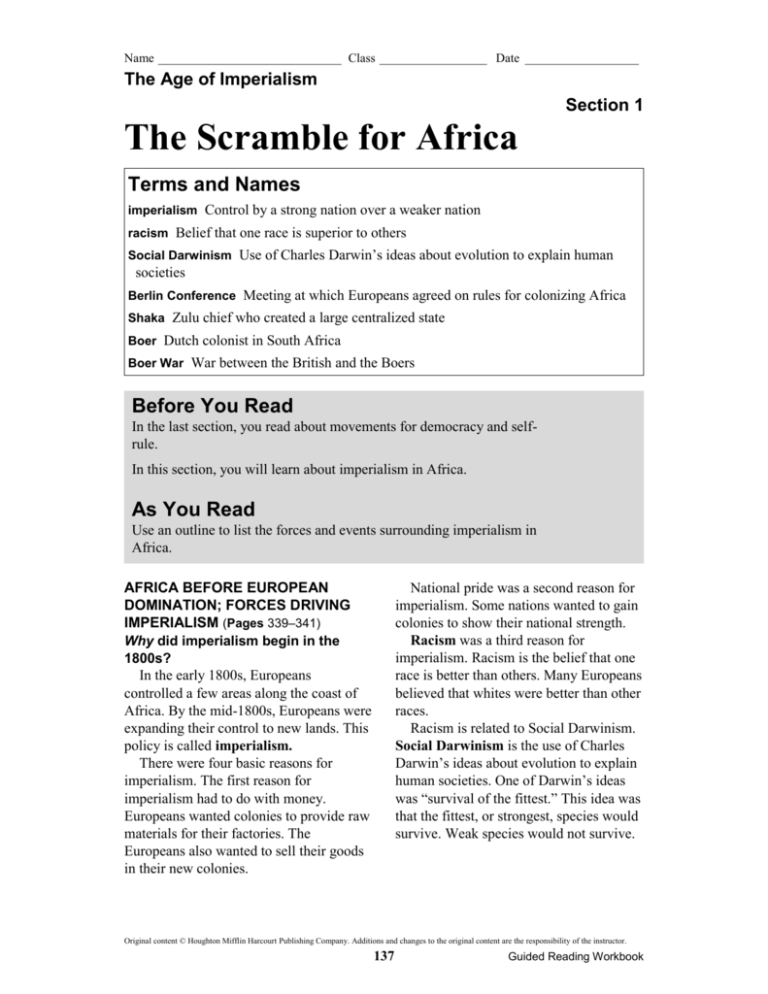
Name _____________________________ Class _________________ Date __________________ The Age of Imperialism Section 1 The Scramble for Africa Terms and Names imperialism Control by a strong nation over a weaker nation racism Belief that one race is superior to others Social Darwinism Use of Charles Darwin’s ideas about evolution to explain human societies Berlin Conference Meeting at which Europeans agreed on rules for colonizing Africa Shaka Zulu chief who created a large centralized state Boer Dutch colonist in South Africa Boer War War between the British and the Boers Before You Read In the last section, you read about movements for democracy and selfrule. In this section, you will learn about imperialism in Africa. As You Read Use an outline to list the forces and events surrounding imperialism in Africa. AFRICA BEFORE EUROPEAN DOMINATION; FORCES DRIVING IMPERIALISM (Pages 339–341) Why did imperialism begin in the 1800s? In the early 1800s, Europeans controlled a few areas along the coast of Africa. By the mid-1800s, Europeans were expanding their control to new lands. This policy is called imperialism. There were four basic reasons for imperialism. The first reason for imperialism had to do with money. Europeans wanted colonies to provide raw materials for their factories. The Europeans also wanted to sell their goods in their new colonies. National pride was a second reason for imperialism. Some nations wanted to gain colonies to show their national strength. Racism was a third reason for imperialism. Racism is the belief that one race is better than others. Many Europeans believed that whites were better than other races. Racism is related to Social Darwinism. Social Darwinism is the use of Charles Darwin’s ideas about evolution to explain human societies. One of Darwin’s ideas was “survival of the fittest.” This idea was that the fittest, or strongest, species would survive. Weak species would not survive. Original content © Houghton Mifflin Harcourt Publishing Company. Additions and changes to the original content are the responsibility of the instructor. 137 Guided Reading Workbook Name _____________________________ Class _________________ Date __________________ Section 1, continued People who believed in Social Darwinism argued that fit people and nations survived. They also believed that weak people and nations would not survive. Christian missionaries also supported imperialism. They thought that European rule would end the slave trade. The missionaries also wanted to convert the people of other continents to Christianity. Europeans began to take lands in Africa for these reasons. Technology helped the Europeans succeed. The African peoples were divided. It was hard for them to resist European advances. 2. What was the purpose of the Berlin Conference? _______________________________ _______________________________ _______________________________ THREE GROUPS CLASH OVER SOUTH AFRICA (Pages 342–344) What groups fought over South Africa? In South Africa, three groups struggled over the land. In the early 1800s, the Zulu chief Shaka fought to win more land. Shaka’s successors were not able to keep his kingdom intact. The Zulu land was taken over by the British in 1887. Meanwhile, the British took control of the Dutch colony on the southern coast. Thousands of Dutch settlers, called Boers, moved north to escape the British. This movement is known as the Great Trek. The Boers fought the Zulus whose land they were entering. At the end of the century, Boers fought a vicious war against the British called the Boer War. The Boers lost this war. The Boers then joined the British-run Union of South Africa. 1. What are four reasons for imperialism? ______________________________ ______________________________ ______________________________ THE DIVISION OF AFRICA (Pages 341–342) How did European nations claim African lands? The “scramble for Africa” began in the 1880s. Diamonds were discovered in South Africa in 1867. Gold was discovered there in 1886. Europeans became more interested in the continent. The European nations did not want to fight over the land. They met at the Berlin Conference in 1884–85. They agreed that any nation could claim any part of Africa by telling the others and by showing that it had control of the area. Europeans quickly grabbed land. By 1914, only Liberia and Ethiopia were free from European control. 3. Who were the Boers, and whom did they fight? _______________________________ _______________________________ _______________________________ Original content © Houghton Mifflin Harcourt Publishing Company. Additions and changes to the original content are the responsibility of the instructor. 138 Guided Reading Workbook Name _____________________________ Class _________________ Date __________________ Section 1, continued As you read about the European colonization of Africa, fill out the chart by writing notes in the appropriate spaces. The Forces of Imperialism 1. Note three motives behind the European race for colonies. 2. Note two technological advantages Europeans had over the Africans. 3. Note two factors within Africa that made it vulnerable to European conquest. The Division of Africa 4. Note two outcomes of the Berlin Conference in 1884 and 1885. 5. Note three groups that clashed over territory and resources in South Africa. 6. Note one outcome of the Boer War. Original content © Houghton Mifflin Harcourt Publishing Company. Additions and changes to the original content are the responsibility of the instructor. 139 Guided Reading Workbook

